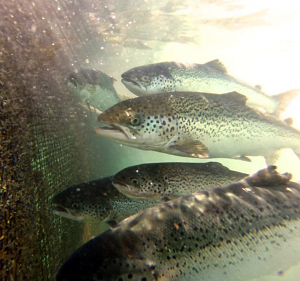
Farmed Atlantic salmon lined up against the nets, barely moving. This is the classic behaviour reported for fish suffering from the disease caused by the piscine reovirus. © Alexandra Morton.
New Viruses to British Columbia’s Coast
Piscine Reovirus
Piscine reovirus (PRV) is highly contagious and strongly linked to a heart disease in salmon called Heart and Skeletal Muscle Inflammation (HSMI).
This disease has swept through fish farms in Norway. Raincoast Research director Alexandra Morton co-published the first scientific paper on PRV in BC, reporting that its genetic sequence appears to have originated from northern Norway and arrived in BC in approximately 2007. (Kibenge et. al. 2013).
Raincoast Research is currently tracking PRV in farmed and wild salmon throughout BC. It is investigating whether PRV infection increases in wild fish that are exposed to salmon farms. This investigation has become controversial due to the fact that the BC fish farm industry is heavily infected by the virus.
While some research suggests PRV is naturally found in BC and is harmless, the evidence Raincoast Research has published suggests it is a Norwegian-origin virus. Other researchers report that sockeye salmon infected with PRV have reduced success in reaching their spawning grounds.
Of paramount concern is the trend for pathogens to mutate to higher levels of virulence in salmon farms. Even if a virus is local to an area, it can become dangerous to wild fish by entering the farm salmon environment, exploding in numbers, and becoming more virulent.
Facts about PRV
- Up to 95 per cent of BC farmed salmon in the markets is testing positive for PRV
- BC appears to have a Norwegian strain of PRV – a virus that has spread rapidly through Norway.
- Research shows PRV is highly contagious and can spread through the water.
- Infected fish can be thin, lethargic and will remain motionless in the water.
- Researchers are concerned that wild salmon infected with PRV may not be able to swim upriver to spawn.
Federal Court Ruling
Alexandra Morton of Raincoast Research was the first person to raise concerns about PRV on the BC coast. In 2015, Morton and Ecojustice won a federal lawsuit against a private fish farming company and the federal government.
- A federal court struck down aquaculture licence conditions allowing the transfer of young farmed salmon infected with viruses to open-pen farms in the ocean. It did so because the way the transfer licence was written violated section 56 of the Fisheries Act.
- In May 2016, Marine Harvest and Fisheries and Oceans Canada were prepared to appeal this decision. Federal lawyers paused the appeal in response to a government scientist’s release of new information on PRV virus impacts on BC salmon.
- Canada and Marine Harvest are scheduled to return to court to try to overturn this ruling and allow industry to use diseased fish. No court date has been set.

